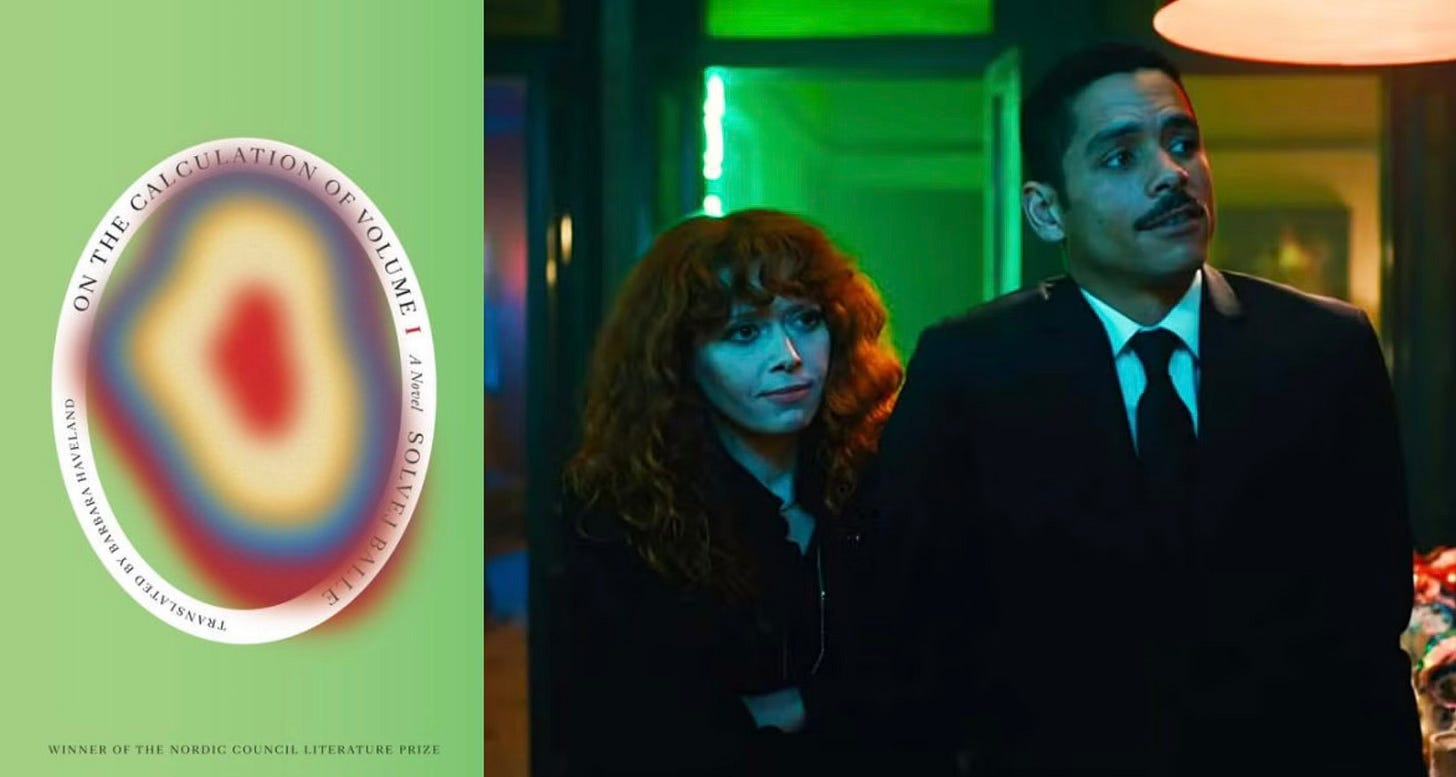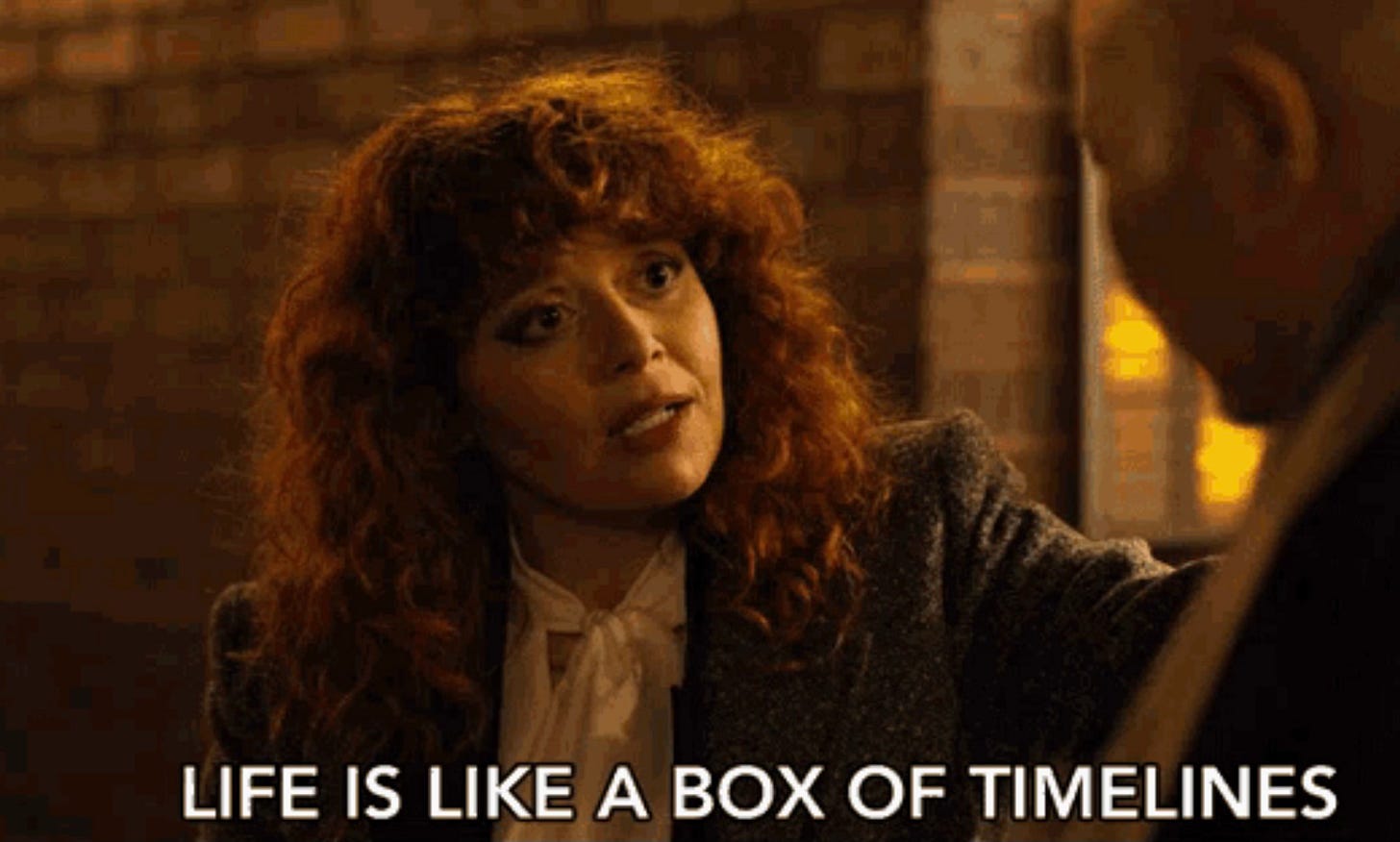A book review nestled inside a Russian Doll.
A Book review of On The Calculation of Volume I, Time Loop stories, Our Current Culture, Trauma, Mental Illness, and Russian Doll.
I love time loop stories. Possibly because it reflects my lived experience since the age of ten—therefore, this piece will talk about mental illness, depression, Obsessive Compulsive Disorder, and unaliving. I have tried not to spoil On The Calculation of Volume I—however, this is a review with some plot. Season 1 of Russian Doll will be spoiled!
On the Calculation of Volume 1 by Solvej Balle, translated from Danish by Barbara J. Haveland, is the first book in a series of seven. So far, two have been translated into English by New Directions Publishing. I read this volume in a few sittings, making a year of days squeeze into a handful as I followed Tara Selter, an antiquarian book dealer traveling to Bordeaux for a rare books auction to acquire books for the business she runs with her husband Thomas. On the morning of "November 19th," she wakes in her Paris hotel to enjoy breakfast when she notices someone dropping a piece of bread, which also happened the day before. This kickstarts her realization that this is the second time she has experienced November 18th. A day she will continue to experience as she returns home to her husband earlier than either had planned.
What has been described as Groundhog Day in the Danish is oversimplifying things—a grand lesson isn't trying to be taught, no moral reasoning is behind the loop, and we don't know the cause for the loop (it's seven volumes, after all). If anything, it's more like Russian Doll, a series on Netflix starring Natasha Lyonne, nestled within a new world where there seems to be no logic (more on this later). On the Calculation of Volume is a lonely and introspective novel full of thoughtful sentences and observations that hold the reader's attention even within its repetitive style. I read all of this book during an OCD (Obsessive Compulsive Disorder) spiral, a cycle of repetitive thoughts and behaviors making simple everyday tasks nearly impossible, causing every day to feel like an endless loop of repeated actions and thoughts. At first, reading such a repetitive novel felt annoying, almost too claustrophobic, but I quickly realized annoying and claustrophobic weren't the right words—this is me. As I was calculating every movement my body made in my own home and every thought was retraced, trying to find a way through my loops, Tara was my companion, also calculating at every opportunity to understand the inner workings of whenever or wherever she may be to get out of her loop and continue onto November 19th.
The book's goal is not to figure out how to escape the time loop, at least not right away. This first volume concerns Tara and the reader with the reality and lack of understanding of this new world or the new space of existence she is now part of—it’s about observing, gathering information, asking for help, and reflecting.
That strange moment when the ground under one’s feet falls away and all at once it feels as though all predictability can be suspended, as though an existential red alert had suddenly been triggered, a quiet state of panic which prompts neither flight nor cries for help, and does not call for police, fire brigade, or ambulance. It is as if this emergency response mechanism is there on standby at the back of the mind, like an undertone, not normalcy audible, but kicking in the moment one is confronted with the unpredictability of life, the knowledge that everything can change in an instant, that something which cannot happen and which we absolutely do not expect is nonetheless a possibility.
Tara returns from Paris unplanned, and when Thomas wakes to find her unexpectedly beside him in bed—she calmly explains…
That nothing has happened. Or hardly anything. It was merely a rift in time. But I was back, we were together, no one had died, no one had been hurt, there had been no tragedies, accidents, disasters, no ambulances or funerals.
This lengthy mantra to calm Thomas continues for multiple days throughout the text, with some variety. This need for assuring words is initially for herself as much as Thomas. These repetitions are a way of seeking comfort and reassurance often sought by individuals with OCD like myself. We wake in the same world daily, full of unknowns.
Tara wakes in her bed each morning and waits for what she hopes will be new sounds or perhaps a new feeling. Instead, she hears the well-rehearsed sounds of all her previous November 18ths, and she resumes her day of assuring Thomas that everything is okay and no one is hurt. Tara explains what is happening to her, which Thomas always believes, and together, they begin to form a new hypothesis for what could be happening to Tara.
Often, we would simply come to the conclusion that you cannot know everything, that you have to accept some displacement in life, that you have to expect inconsistencies, and that was what we encountered: patterns and inconsistencies, two worlds trying to merge.
Tara and Thomas continue in this new normal for multiple days. While Tara tries to understand the rules, she notices Thomas stays the same, and she continues to live as if time were moving forward. Her hair is growing, she has to continue cutting her nails, and she consumes food that doesn’t return to the grocery store or the garden like the food Thomas consumes, thus labeling herself a “monster” and Thomas a “ghost.”
“I am living in a time that eats up the world.”
Eventually, upon realizing she is stealing every single first November 18th for Thomas, Tara decides to move on from her days with him and seeks space for herself in the apartment but away from Thomas. She learns his daily movements, willing herself to live as a ghost among him. Tara eventually leaves the apartment, seeking a place of her own. She realizes she must move on and form a life for herself.
It felt empty, but with the emptiness came a sense of relief: a well-known evening, an outline without too many details. There was something refreshing about the lack of detail, the lack of imaginings and scenarios and alertness and condensation.
Tara does not tell us much about herself—her reflections never go past a certain point in her history. Everything is contained to her time living in the house with Thomas. Everything is contained to the world she inhabits now, and I wonder if we will push beyond that in later books…
(Aside: The answer is yes. At the time of writing this, I have completed Vol 2. However, this review will not include any thoughts about that book, and this review is not influenced by the second volume.)
It’s an interesting choice for a novel centered in one character's very introspective mind. Although Tara's observations are contained to this one day, November 18th, her goal is still to understand why this particular day? How did it happen? And how can it end?
I made the mistake of watching one YouTube review of this novel from someone who did not enjoy it at all, which is fine. The main complaint was that Tara did nothing throughout the first volume. What would you do in this situation? Would you entirely change everything or continue to live in a stasis? Would you even have the cognitive ability to? Perhaps on a metaphorical level, you know what it is to wake up every day feeling like you are in an endless loop, making no changes, going through the motions, static, stuck, interacting with no one but yourself and perhaps a partner. This can be due to mental illness, chronic pain, or a disability. What does this say about us and how we use our free time, which Tara finds she now has. Yet, she still can't seem to use the time she has for much beyond her loops.
At a stationary store I bought a notebook, hardback with an olive-green cloth binding. Lined paper and stitched spine. It hasn’t been put to use yet, but I feel I am moving toward something new which has not quite started yet.
Time is what we as a society most desire: less of a forty-plus hour work week and more time for the things that bring us joy and give our lives purpose. Often, however, when we have the time, we are too stuck in the things we feel need to be done. Our grand plans become lost to our era's version of a time loop—rotting, doom-scrolling, seized by imposter syndrome, life admin, caregiving, etc. Instead, time and our bodies keep moving forward like Tara's, despite the things we want to be doing. We buy the perfect notebook that will get us writing, yet we stare at it, waiting for the right moment.
“Yet another November 18th is almost over…and I am going nowhere.”
So what does time mean? What does it look like to do something?
In the first season of Russian Doll, mental health, our past, and aging are themes discussed and explored by the main character, Nadia, played by Natasha Lyonne. Her loop begins the night of her 36th Birthday party—she is now older than her mother was at her death, whose severe mental illness affected Nadia's adulthood as much as her childhood. Nadia's past is marked by a familial relationship with the Holocaust and the Krugerrands (South African gold coins, her family legacy and safety net if Hitler or any other fascist forces came back) that Nadia's mother Nora loses. After leaving the celebration, Nadia is hit by a car, dies, and immediately returns to the bathroom in the middle of her party to the tune of "Gotta Get Up" and a refrain of "sweet birthday baby." Nadia meets Alan, played by Charlie Barnett, who is also stuck in a time loop. Alan suffers from OCD and Anxiety. Alan refuses to seek treatment, as we find out through conversations he has with an ex and others in his life. His first death occurs at the same time as Nadia's when he takes his own life, jumping from the top of his apartment building, something he keeps from her out of shame. When he no longer can take the guilt, Alan admits to Nadia that he believes this is why the time loops started. Nadia self-medicates and drinks heavily, averse to therapy or the word “crazy.” However, her mother constantly floats in her periphery and is continuously fearful of signs that she, too, is unwell, and this birthday loop marks a sort of catalyst for that possibility. Alan appears to be in his loop due to his compulsion to control every aspect of his life and his inability to see beyond his anxiety, which is highlighted by his belief that his failing relationship was on the right track. Unlike Nadia, for much of the first season, Alan doesn't want to escape his time loop—even though he dies repeatedly, he feels in control of events happening around him, a predictability forms which is familiar and comforting. Eventually, Alan realizes he and Nadia can't stay in the loop forever. When the people they love begin disappearing, their worlds break apart, and they begin their separate journeys together to break the loop or perhaps figure out the cause of it.
“Buildings aren’t haunted, people are.”-Russian Doll.
“Routine is an incredible thing…we become what we repeatedly do.”-Alan.
This is a major spoiler (and possibly quite confusing if you haven't seen it), but in the final episode of Russian Doll Season One, the timelines are reset for each character, with each realizing that they are in two separate timelines. In one, only Alan remembers Nadia. Alan's mission is to keep Nadia from being hit by a car the entire night until they reunite. One of the most heartbreaking scenes happens in the other timeline, where only Nadia remembers Alan. Nadia initially believes that she did not prevent Alan from jumping from his apartment roof. She's relieved when Alan walks behind her and asks,
Alan: Do you promise if I don’t jump, I’ll be happy?
Nadia: Absolutely not, but I do promise you won’t be alone.
They keep each other alive throughout the night in their two separate timelines until they meet in a triumphant parade of life, melting their timelines together.
Who knows where On the Calculation of Volume will take us? At the end of book one, Tara continues spiraling forward toward a new kind of future, and I imagine, like Nadia and Alan, she will encounter another November 18th-er like herself.
You can’t escape your time loops. They exist in life often due to our trauma, pasts, mental health, etc. When we decide to move beyond our beliefs about ourselves and our pasts, we can begin moving forward as the people we are meant to be, escaping from our self-imposed time loops or at least finding ways to not always be stuck in them.
I haven’t found a way out…but I found rounds and paths through the day, narrow passages and tunnels I can move along. I cannot get out, but I can find ways in. -Tara










I love a time-travel story, and I *LOVED* Russian Doll, and I am absolutely convinced on reading these novels(? volumes?) - the first isn't out in Australia until April, but I wonder if I can get my hands on a US copy... (It's a nicer cover too!)